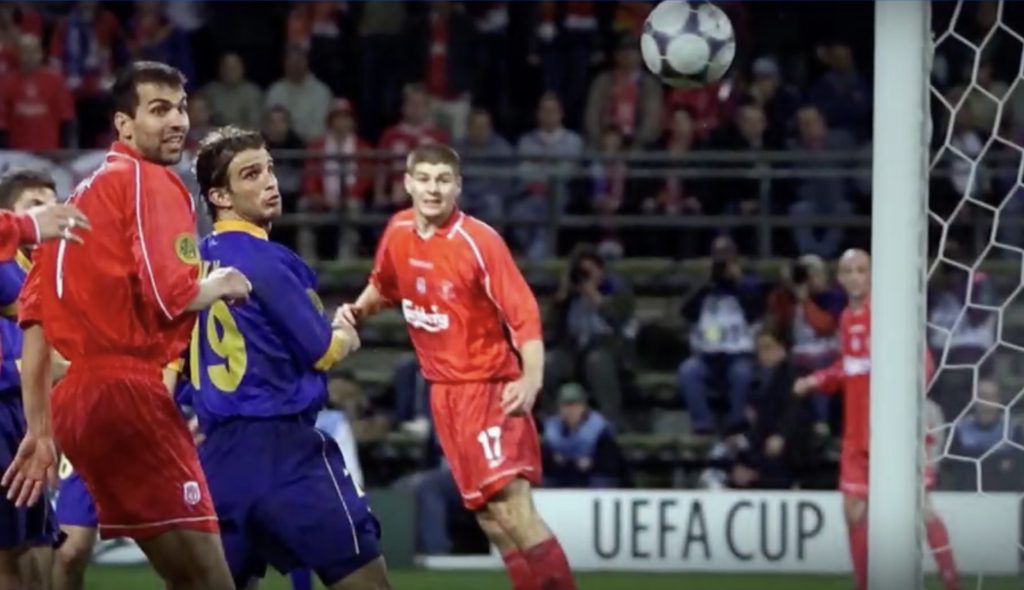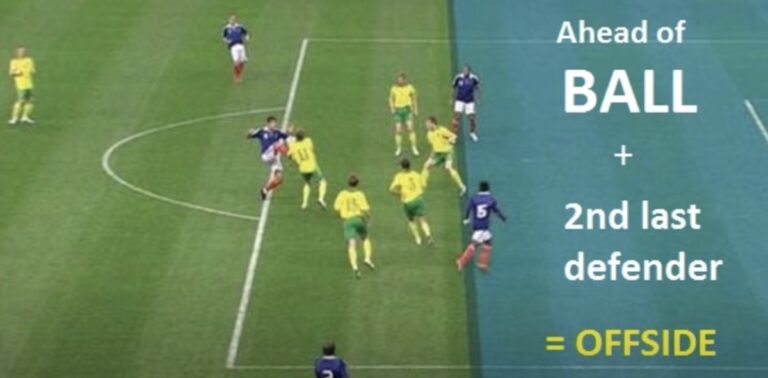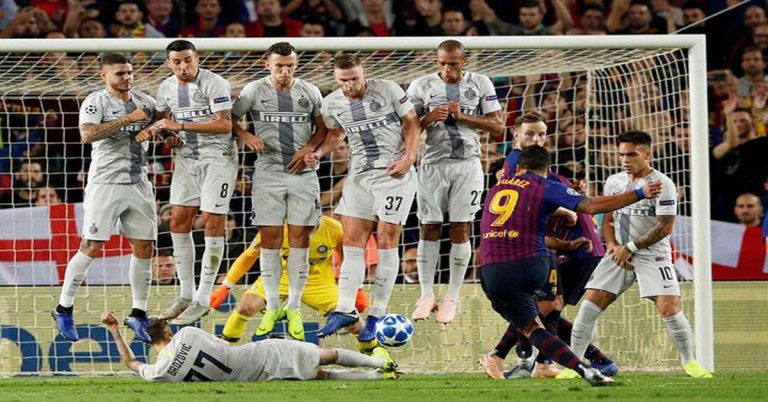What Was The Golden Goal Rule?
Rule changes in football are nothing new.
In fact, they are commonplace. Whether it be a minor alteration to existing regulations which often go unnoticed or more significant adaptations that directly impact players along with managers and fans alike.
The early 1990’s and Football’s governing body FIFA had fashioned a new regulation that would eventually be coined The Golden Goal Rule. It involved the notion of teams being immediately awarded victory by scoring one single goal.

What Was A Golden Goal?
A Golden Goal was a basic concept.
In contrast to traditional extra time with its guaranteed thirty minutes of additional play, the new format dictated that ‘if one of the teams scored a goal at any stage during this half an hour period then that side automatically won the game.’
A simple idea that would create a plethora of complex problems.
Let’s take a closer look at The Golden Goal Rule, its short-lived yet volatile effect on different levels of the sport and the controversial debates it ignited!
Why Was The Golden Goal Rule Created?
The primary purpose of the Golden Goal was to encourage positive play and attacking adventure during extra time. The bait was instant glory which offered the huge incentive to push for a winning goal.
Or simply put – fortune favors the brave.
The advantage to such a proposal meant less reliance on penalties with the old adage that spot kicks are a lottery and never a true reflection of who deserves the victory.
A common perception is that during extra-time both the quality and sense of urgency quickly diminished. Maybe a result of nerves or even basic human nature; that pushing for a decisive goal but leaving yourself exposed defensively poses a far greater danger than focusing all your efforts into not conceding.
Originally the Golden Goal’s working title was ‘Sudden Death.’ However, the name risked fueling fears over the consequences of open and expansive football at such a crucial stage of proceedings.
When Was The Golden Goal Rule First Introduced?
A ‘winner takes all’ scoring system originally made its global debut within 1970’s North American Soccer. Yet the premise wouldn’t fully gain prominence in the realms of elite European competition for another two decades or more.
In typical fashion, FIFA tried and tested their new Golden Goal concept in ‘lesser’ competitions at first. The fresh regulation featured during youth level matches as early as 1992, the Summer Olympics in Barcelona and then a year later in the Confederations Cup.
The first ever Golden Goal was actually scored by Australia’s Antony Carbone during the 1993 World Youth Cup Quarter final against Uruguay. Yet it would be another two years before the Golden Goal would finally grace top tiers of the professional game.
Where Was The Golden Goal Rule Famously Used?
Beginning in the Summer of 1995 and used for nearly a decade, The Golden Goal would go on to govern the outcomes of many high profile football matches.
Its first significant use occurred during an English club cup competition called Auto Windscreens Shield Final (or the Football League Cup as it is widely known) between Birmingham City and Carlisle.
Birmingham Midfielder Paul Tait forced home a 103rd minute header, this moment signaling an end to the final and handed the Midland’s team victory.
“For the first time in Wembley history,” excitable match commentator Alan Parry declared with a sense of joy. “We can say with absolute certainty that’s the winner!”
By the mid 90’s, outside of the English game and FIFA competitions, there was still no obligation for UEFA to implement the Golden Goal system. But Europe’s elite gaming body quickly adopted the format and wasted no time in implementing it into their Euro 96 tournament.
Ironically it would play a crucial role in the final itself. With Germany and Czech Republic deadlocked at 1-1 after 90 minutes – extra time loomed large.
Future AC Milan forward Oliver Bierhoff rose from the bench to bolster the German attack, and a mere five minutes into the first period of extra time, swiveled in the box to strike a tame effort at Czech keeper Petr Kouba. However, the goalie could only pad the ball downwards into the turf and watch it bobble tamely into the bottom corner of his net.
The moment provided the strangest of sights, the Czech players collapsed to the ground and seemed overcome with a realization. The game had ended with immediate effect as the Germans stormed the Wembley pitch all around them.
The Golden Goal made its official World Cup swan song two years later at France 98. One of its most famous outings occurred during the host’s last 16 clash with Paraguay when, despite the South American’s continued threat, French Captain Laurent Blanc popped up to score with only six minutes of the game remaining.
Euro 2000 also saw the Golden Goal prove significant with France benefiting once again as David Trezeguet struck late on to defeat Italy.
Strangely the Golden Goal had much less of an impact on club competitions. In fact, no Champions League game has ever been decided by the format and with very few UEFA cup (now the Europa League) matches affected either.
Was The Golden Goal Rule Popular?
Two main viewpoints surrounded the Golden Goal.
Those in favor of the rule change often cited FIFA’s noble intentions as the main appeal. Their valid attempt to create excitement in a stereotypically overly cautious portion of the game and to coax offensive bravery out of often hesitant players.
The opposing view maintained that such a law shift causes several damning issues. For example – higher stakes and increased jeopardy tended to make teams even more defensive than before.
Staunch fan bases were resistant to the format too, believing it blatantly attacked the spirit of the game and a notion that any team would be denied the chance to fight back was unsavory.
This overriding feeling of unfairness would finally be exposed on the grandest stage at the 2002 World Cup during a second round clash between co-hosts South Korea and European giants Italy.
The game itself was already a tense affair even before things turned ‘golden.’ To anyone’s standards, the Italian’s were treated poorly by referee Byron Moreno throughout the match, blatant penalties denied amongst questionable disallowed goals and striker Francesco Totti’s sending off for simulating a dive when he’d clearly been fouled.
Christian Vieri had put Italy ahead in the first half with a bullish header. But a sense of injustice struck when Seol Ki-Hyeon equalized in the 88th minute and dragged the game screaming into extra time.
A penalty shoot-out was looming large. Then with just three minutes remaining, Ahn Jung-Hwan soared above Paolo Maldini to head the ball into the ground and passed a flailing Gianluigi Buffon.
This particular Golden Goal arrived so late that the Italians had little chance to reply and were eliminated from the competition in the blink of an eye.
It created negative press on such a global scale to only damage the format’s waning reputation further. To such a degree that UEFA reacted, replacing the Golden Goal with their own creation, the ill-fated Silver Goal.
Following a disastrous major tournament for its Golden counterpart, UEFA quickly phased the Silver Goal into European club competitions from Autumn 2002.
The Silver Goal ruled that ‘if a side scored a goal or more to lead after the first period of extra-time then they’d be declared the winner. In a positive move and unlike a Golden Goal, this revised concept did allow for teams to equalize and potentially rescue themselves.
However, all too familiar issues resurfaced once more. Because if a side were to fall behind late in the allotted fifteen minutes of extra time it would again leave little opportunity to respond – meaning the Silver Goal would be destined to produce further negative play.
Oddly during the second half of extra time, teams effectively reverted back to the traditional rules that had been in place for generations – and games would then become more expansive which only highlighted the excitement without golden or silver incentives.

When Was The Golden Goal Rule Abolished?
Even prior to Euro 2004, FIFA announced that both Golden and Silver Goals were to be withdrawn from footballing rulebooks after the tournament’s end. An infamous goal credited with the eventual demise of ‘instant win’ systems happened as Greece faced Czech Republic in the semi-finals of Euro 2004.
The game finished 0-0 in normal time with the opening 15 minutes of extra time almost passing by without incident. But moments before the interval, Greece floated in a corner which their centre back Traianos Dellas met firmly with his head, powering the ball into the net – sending the unfancied Greeks into their first major final.
That talented Czech side were sent home seconds later with the so-called Silver Goal effectively becoming ‘gold.’ In the weeks that followed there was a huge outcry and swift return to the traditional extra-time ruling which remains the standard to this day.
Conclusion
The Golden Goal was very much a reflection of the era in which it was created. The law change promised to be an integral part of the sport’s future, bridging the footballing of old with exciting innovations belonging to a new millennium.
Over the course of ten years, the format itself is remembered as more of a whimsical novelty than total failure but did raise serious debates surrounding the alteration of long standing football traditions.
Golden Goals showed signs they might enhance the game in terms of offensive drama and enthralling finishes. Yet the foundations of unrest ultimately lay in human response. Fans who seemingly weren’t ready for the child-like nature of the rule and a ‘next goal wins’ mentality.
The classic guidelines surrounding extra time have ultimately held their own and gone on to show that ‘if it isn’t broke then don’t fix it.’
Sometimes the oldies are the best.

Typically it’s my passion for Sports and Music that get the typing juices flowing. But ultimately I enjoy writing or blogging about any topic I can get my keyboard thrashing hands on!






